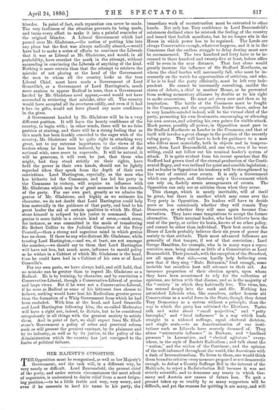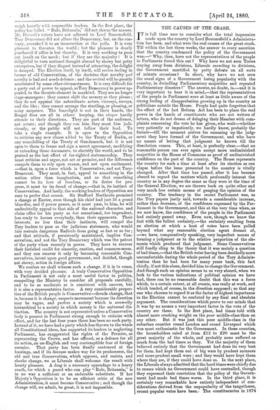HER MAJESTY'S OPPOSITION.
THE Opposition must be reorganised, as well as her Majesty's Government, and the task will, in a different way, be very nearly as difficult. Lord Beaconsfield, the present chief of the party, and under certain circumstances the most adroit of organisers, is understood to desife relief from a most fatigu- ing position,—to be a little feeble and very, very weary, and even if he consents to lend his name to his party, the
immediate work of reconstruction must be entrusted to other hands. Not only has Tory confidence in Lord Beaconsfield's astuteness declined since he mistook the feeling of the country and issued that foolish manifesto, but he no longer sits in the House in which power has to be regained. The Lords are always Conservative enough, whatever happens, and it is in the Commons that the endless struggle to delay destiny must now be recommenced. The two hundred and forty have to be in- creased to three hundred and twenty-five at least, before office will be even in the near distance. That fact alone would greatly increase the influence of Sir Stafford Northcote, on whom the chief burden will necessarily fall, who must be in- cessantly on the watch for opportunities of criticism, and who, if he is to lead the party efficiently, must be left very inde- pendent. He cannot be incessantly consulting, amidst the storm of debate, a chief in another House, or be prevented from seeking momentary alliances by doubts as to his right to make concessions. He must act every now and then as by inspiration. The battle of the Commons must be fought in the Commons, and the responsible leader there, unless he is very humble-minded indeed, will be the virtual chief of the party, promoting his own lieutenants, encouraging or silencing his own orators, and selecting his own points for visible attack. Much power, possibly all power, in Opposition must pass to Sir Stafford Northcote as Leader in the Commons, and that of itself will involve a great change in the position of the recently ruling party. They will have to look for guidance to a man who differs most materially, both in objects and in tempera- ment, from Lord Beaconsfield, and one who, even if he were willing, could not follow out his nominal leader's system of attack. It is quite evident from his recent speeches that Sir Stafford had grown tired of the eternal production of the Conti- nental Bogey, and was inclined for quiet and sensible legislation ; and as leader in Opposition his tendency will be strengthened by his want of control over events. It is only a Government which can produce, and therefore only a Government which can rely on, flashily scenic arrangements of events. The Opposition can only use or criticise them when they occur.
This change, which is nearly inevitable, will of itself be great, but there is another which may come over the Tory party in Opposition. Its leaders will have to decide more or less consciously whether they will remain Tory Democrats, or whether they will once again become Con- servatives. They have some temptations to accept the former alternative. Their nominal leader, who has hitherto been the soul of the party, or rather its brain, knows of no other policy, and cannot be other than individual. Their best orator in the House of Lords probably believes their six years of power due mainly to that attitude. Their most advanced followers are generally of that temper, if not of that conviction ; Lord George Hamilton, for example, who is in many ways a repre- sentative man, being almost as little of a Conservative as Lord Beaconsfield. Their journals, with the exception of the Standard, are all upon that side,—can hardly help believing even now that if they sing "Rule, Britannia," loud enough, some invisible but resistless host will advance to their aid. An immense proportion of their election agents, upon whom they have been accustomed to rely for the collection of opinions, are bitten with that disease, and so is the majority of the " society " in which they habitually live. The virus, too, has entered deeply into the rank and file. Nothing has astonished Liberals who, like ourselves, rather honour old Conservatism as a useful force in the State, though they detest Tory Democracy as a system without a principle, than the way in which the party has criticised the Elections. Tories talk and write about " small majorities," and " petty boroughs," and "local influences " in a wa,y which leads straight to a widened suffrage, equal electoral districts, and single seats,—to an Americanisation of our insti- tutions such as Liberals have scarcely dreamed of. They abuse "aristocratic influence" in Durham, and "landlord pressure" in Lancashire, and "clerical agitators" every- where, in the style of Burdett Radicalism ; and talk about the " nation," and the wishes of the Continent, and the opinion of the well-informed throughout the world, like Americans with a dash of Internationalism. To listen to them, one would think them bound to criticise every measure proposed as not democratic enough, to defeat a County Suffrage Bill in the interest of the Multitude, to reject a Redistribution Bill because it was not strictly scientific, and to denounce any treaty in which Ger- many and Austria saw causes of future loss. To quit a ground taken up so readily by so many supporters will be difficult, and yet the reasons for quitting it are many, and will
weigh heavily with responsible leaders. In the first place, the policy has failed. " Rule, Britannia," did not charm the masses. Mr. Disraeli's voters have not adhered to Lord Beaconsfield. Tory Democracy did not allure the Democracy, but, on the con- trary, provoked it to an insurrection at the polls. It is very pleasant to threaten the world ; but the pleasure is dearly purchased if office is lost thereby. It is very soothing to pour out insult on the meek ; but if they are the majority ? It is delightful to turn national thought abroad by showy but petty enterprises, but if they disgust instead of attracting, the delight is damped. The Election itself, by itself, will revive feeling in favour of old Conservatism, of the doctrine that novelty pa novelty is bad and needs defence ; and the revival will be greatly accelerated by some other circumstances. It is very difficult for a party out of power to appeal, as Tory Democracy in power ap- pealed, to the theatric element in mankind. They are no longer stage-managers ; they cannot shift the scenery as they please ; they do not appoint the subordinate actors, viceroys, envoys, and the like ; they cannot arrange the startling, or pleasing, or noisy surprises. The lime-light is not in their hands, the Bengal fires are all in others' keeping, the claque hardly attends to their directions. They are part of the audience, not actors ; and though they can hiss, they must hiss judi- ciously, or the public will not follow their lead. To take a single example. It is open to the Opposition to criticise any new clause added to the Treaty of Berlin, or any remodelling of the Treaty of Gundamuck, but it is not open to them to frame and sign a secret agreement, modifying or extending those documents, to electrify the world, and to be praised as the last effort of far-sighted statesmanship. They must criticise and argue, not act or promise, and the difference compels them to rely upon reason, and not upon excitement, —that is, upon a force which is Conservative, and not Tory- Democrat. They must, in fact, appeal to something in the nation other than imagination, and as that something cannot be its love of freedom, or its desire for pro- gress, it must be its dread of change,—that is, its instinct of Conservatism. And lastly, the working leaders of Opposition are sure to prefer that course. Sir Stafford Northcote promised a change at Exeter, even though his chief had just lit a grand blue-fire, and if power passes, as it must pass, to him, he will undoubtedly appeal to that side of the national character, and claim office for his party as less sensational, less imprudent, less ready to harass everybody, than their opponents. Their interests, no less than their instincts, will compel the Tory leaders to pose as the judicious statesmen, who would fain restrain dangerous Radicals from going so fast or so far ; and that attitude, if persistently maintained, implies Con- servatism, and not the Tory Democracy which was the patent of the party when recently in power. They have to recover their forfeited credit for sincerity, caution, and common-sense, and they can recover it only by becoming reasonable Con- servatives, intent upon good government, and decided, though not showy, action in foreign affairs.
We confess we shall witness such a change, if it is to come, with very decided pleasure. A truly Conservative Opposition in Parliament is not only a most useful factor in politics, compelling the Ministry to consider all proposals carefully, and to be as moderate as is consistent with success, but it is also a representative factor. A very considerable propor- tion of the British people is Conservative—dreads change, that is, because it is change, suspects movement because its direction may be vague, and prefers a society which is avowedly hierarchical to a society in which money is the universal dis- tinction. The country is not represented unless a Conservative 'body is present in Parliament strong enough to criticise with effect, and for the last four years there has been no such party. Instead of it, we have had a party which has thrown to the winds all Constitutional ideas, has supported its leaders in neglecting Parliament, has exaggerated the rights of the Premier, as representing the Crown, and has offered, as a defence for all its action, an un-English and very contemptible fear of foreign enemies. That party has been finally sentenced at the hustings, and if its decease makes way for its predecessor, the old and true Conservatism, which opposes, and resists, and checks change, we as Liberals shall welcome the result with hearty pleasure. A drag is a necessary appendage to a heavy coach, for which a guard who can play " Rule, Britannia," is in no way a sufficient or an endurable substitute. If her Majesty's Opposition is to be an efficient critic of the new Administration, it must become Conservative ; and though the change will, we admit, be great, it is not impossible.



































 Previous page
Previous page